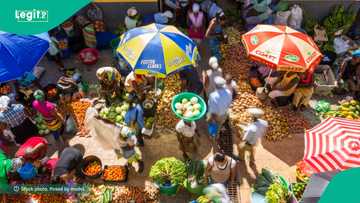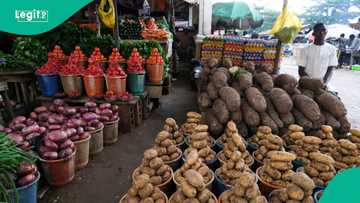World Bank Sends Strong Warning Against Further Petrol Price Increase in Nigeria
- The World Bank warned that a further increase in the price of gasoline could jeopardise Nigeria's already fragile economic recovery
- This follows the sharp increase in prices from ₦175 per liter to over ₦1,000 nationwide since the removal of fuel subsidies
- The World Bank anticipated that Nigeria's GDP would grow by 3.3% in 2024 and 3.6% in 2025–2026 as macroeconomic and fiscal reforms start to take hold
Legit.ng journalist Zainab Iwayemi has over 3-year-experience covering the Economy, Technology, and Capital Market.
The World Bank has warned that a further spike in the price of Premium Motor Spirit (petrol) could endanger Nigeria's already precarious economic recovery after fuel subsidies were eliminated.

Source: Getty Images
This was revealed on the October edition of its Africa's Pulse report.
In May 2023, President Bola Tinubu formally declared that gasoline subsidies would no longer be provided. Since then, prices have soared from N175 per liter to over N1,000 nationwide.
The report notes:
“While the inflationary effects stemming from a weakened naira in the early months of this year and the removal of the gasoline subsidy in the latter half of 2023 appeared to be gradually subsiding, a further increase in gasoline prices by 40-45 percent in September could reverse this disinflationary trend.”
As macroeconomic and fiscal reforms start to take hold, Nigeria's economy is expected to develop by 3.3 percent in 2024 and 3.6 percent in 2025–2026.
According to the data, inflation slowed to 33.4 percent in July and 32.2 percent in August after reaching a peak of 34.2 percent year over year in June 2024. It highlights that greater growth rates in 2025 should result from the consolidation of these policies.
The paper also notes that in 2024, the naira has become one of Sub-Saharan Africa's worst-performing currencies. By the end of August 2024, the naira had lost over 43 percent of its value year-to-date, making it one of the weakest currencies in the region, along with the South Sudanese pound and the Ethiopian birr.
Delays in Nigeria's central bank's foreign exchange disbursements, a spike in demand for US dollars on the black market, and a lack of dollar inflows are all factors contributing to this depreciation.
World Bank mentions timeframe economic hardship will end
Legit.ng reported that the ability of Nigeria to maintain important reforms for at least 15 years will determine its course toward economic transformation, according to Indermit Gill, senior vice-president of the World Bank Group.
Speaking on Monday, October 14, 2024 at the 30th Nigerian Economic Summit in Abuja, the official emphasized the necessity of consistent policy implementation and political commitment to solve the nation's long-standing structural issues that impede long-term growth and development.
The warning comes amid mounting public discontent following the removal of petrol subsidies and the unification of the country’s multiple exchange rates.
PAY ATTENTION: Сheck out news that is picked exactly for YOU ➡️ find the “Recommended for you” block on the home page and enjoy!
Source: Legit.ng




